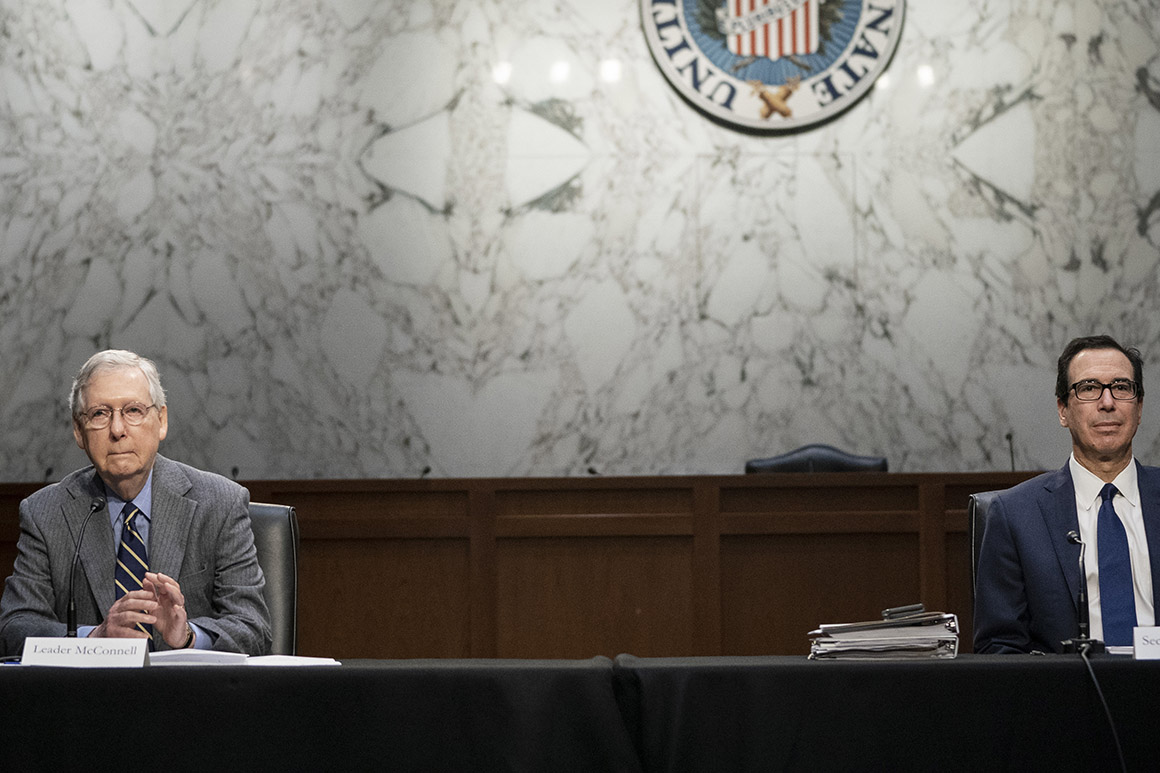
And Senate GOP leaders and the White House conceded to a Democratic demand for tens of billions of dollars for hospitals and health-care providers as part of the rescue package. There also appears to be broad support for $350 billion in loans to small and medium-sides businesses that have been decimated as the U.S. economy grinds to a jarring halt in the facing of the growing coronavirus outbreak.
“What [McConnell] has instructed his committees to do is to finish drafting legislation that reflects agreements reached so far, and where the chairmen and the majority believe Democrats could be in a position to support by the time the vote occurs,” said White House Legislative Affairs Director Eric Ueland, a key Trump administration official involved in the high-level talks. “It’s critically important that Congress be in a position to act for the American people and the American economy on Monday.”
McConnell was hopeful about the prospects for an agreement, telling reporters: “I think we’re clearly going to get there.”
“Basically, we know the general contours of what this is going to look like,” added Senate Majority Whip John Thune (R-S.D.), as he left a closed-door GOP luncheon earlier in the day. Now it’s just a question of plugging in some of the policy, and figuring out where the numbers are.”
“The Democrats are getting some of the things they’ve asked for,” said Thune, ticking off priorities like immediate relief to individuals, protections for health care workers, and shoring up small businesses. “They’re getting what they wanted on unemployment insurance.”
Senate Democrats have been tight-lipped about specific issues but generally said Republicans were making good-faith offers as they attempt to reach agreement.
“We’ve reached a point where the big issues — the really big important issues — are just interrelated, and we can make progress,” added Sen. Ron Wyden (D-Ore.), one of his party’s top negotiators on financial issues.
In a sign that negotiations were reaching a critical point, Pelosi spent part of Saturday flying back to D.C. Mnuchin spoke with Pelosi and Schumer during the afternoon.
„We’re making very good progress. I’m optimistic we can make a deal,“ Schumer said late Saturday afternoon.
McConnell had originally demanded an agreement be reached by Saturday afternoon.
Mnuchin declined to comment on the talks, but told reporters that he’s also spoken with President Donald Trump and Vice President Mike Pence.
„Everybody’s working very hard,“ Mnuchin said just before 4 p.m. on Saturday.
Senate Republicans earlier tried to break the deadlock by delivering their latest concession to Democrats on one of the biggest remaining issues — $250 billion more for unemployment insurance payments. The two sides huddled separately as they sought a way to incorporate the Democratic demands, such as longer-term benefits for furloughed workers.
„We have a good bipartisan agreement on enhanced unemployment compensations,“ said Finance Committee Chairman Chuck Grassley (R-Iowa).
As negotiations moved forward, the size and scope of the package appeared to steadily increase. National Economic Council Director Larry Kudlow said earlier Saturday that the price tag of the legislation was expected to exceed $1.3 trillion, and that the total size of the package, including loans from the federal government, would likely exceed 10 percent of GDP — roughly $2 trillion. That would include a payroll tax holiday for small businesses.
During a Senate GOP lunch, Republicans discussed an idea from the Trump administration for possible specific assistance for General Electric and Boeing, but several pushed back on it, including Sen. Ted Cruz (R-Texas), according to two sources familiar with the meeting.
Cruz later tweeted his opposition to „a special carve-out“ for the two companies, adding, „Millions are losing jobs; we don’t need bailouts or corporate welfare—those companies should participate in the same liquidity programs as everyone else.“
Inside the Trump administration, there is a strong desire to help both Boeing and GE, a major contributor to the Boeing supply chain. Both companies employ tens of thousands of workers, and the administration wants to prevent any major loss of jobs at the iconic firms.
In addition to providing the companies money or loans directly through the „Phase 3“ package, Mnuchin is also trying to ensure the legislation gives both Treasury and the Federal Reserve the flexibility to loan the two companies additional funds, according to three sources familiar with the Hill negotiations.
Another issue still under negotiation is the Democrats’ call for a „State Stabilization Fund,“ which would assist state governments with looming revenue shortfalls during the pandemic.
Democrats are optimistic about their ask on aid to states. In a tweet, Sen. Chris Murphy (D-Conn.) said Saturday that Republicans are now negotiating on the terms and amount of funding.
The debate over expanding paid leave may be the toughest remaining point of conflict.
The Senate pushed through the House’s „Phase 2“ relief package earlier this week which included new paid sick leave provisions. While the Senate approved the measure in a 90-8 vote, McConnell had to convince his caucus to support it and vowed to address shortcomings in this new, third stimulus package.
The discussions come after Senate Republicans introduced a $1 trillion measure Thursday to salvage the economy by providing assistance to individuals, small businesses and industries. Under the GOP proposal, individuals and families would receive $1,200 and $2,400 in direct cash payments based on their income. But some Republicans, including Sens. Josh Hawley (Mo.) and Mitt Romney (Utah), complained the proposal’s structure — as written — would penalize lower income Americans who do not have a taxable income. Republican lawmakers and aides say this has been resolved.
Nancy Cook contributed to this report.
Source: politico.com
See more here: news365.stream






